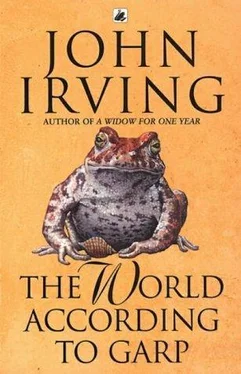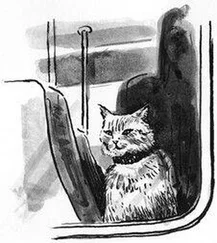Mrs. Poole, please believe me: I don't think that's “funny.” But along comes one of those starving Indians. He sees all the wedding guests mourning the death of their friends, and their friends' elephant; much wailing, rending of fine ctothes, spilling of good food and drink. The first thing he does is to take the opportunity to slip into the wedding while the guests are distracted and steal a little of the good food and drink for his starving family. The second thing he does is start to laugh himself sick about the manner in which the revelers disposed of themselves and their elephant. Alongside death by starvation, this method of enormous dying must seem funny, or at least quick, to the undernourished Indian. But the wedding guests don't see it that way. It is already a tragedy to them; they are already talking about “this tragic event,” and although they could perhaps forgive the presence of a “mangy beggar” at their party—and even have tolerated his stealing their food—they cannot forgive him for laughing at their dead friends and their dead friends' elephant.
The wedding guests—outraged at the beggar's behavior (at his laughter, not his thievery and not his rags)—drown him in one of the beer buckets that the late revelers used to water their elephant. They construe this to represent “justice.” We see that the story is about the class struggle—and, of course, “serious,” after all. But I like to consider it a comedy about a natural disaster: they are just people rather foolishly attempting to “take charge” of a situation whose complexity is beyond them—a situation composed of eternal and trivial parts. After all, with something as large as an elephant, it could have been much worse.
I hope, Mrs. Poole, that I have made what I mean clearer to you. In any case, I thank you for taking the time to write to me, because I appreciate hearing from my audience—even critically.
Yours truly,
"Shithead"
Garp was an excessive man. He made everything baroque, he believed in exaggeration; his fiction was also extremist. Garp never forgot his failure with Mrs. Poole; she worried him, often, and her reply to his pompous letter must have upset him further.
Dear Mr. Garp,
[Mrs. Poole replied]
I never thought you would take the trouble to write me a letter. You must be a sick man. I can see by your letter that you believe in yourself, and I guess that's good. But the things you say are mostly garbage and nonsense to me, and I don't want you to try to explain anything to me again, because it is boring and an insult to my intelligence.
Yours,
Irene Poole
Garp was, like his beliefs, self-contradictory. He was very generous with other people, but he was horribly impatient. He set his own standards for how much of his time and patience everyone deserved. He could be painstakingly sweet, until he decided he'd been sweet enough. Then he turned and came roaring back the other way.
Dear Irene:
[Garp wrote to Mrs. Poole]
You should either stop trying to read books, or you should try a lot harder.
Dear Shithead,
[wrote Irene Poole]
My husband says that if you write to me again, he'll beat your brains to a pulp.
Very sincerely,
Mrs. Fitz Poole
Dear Fitzy and Irene:
[Garp shot right back]
Fuck you.
Thus was his sense of humor lost, and his sympathy taken from the world.
In “The Pension Grillparzer” Garp had somehow struck the chord of comedy (on the one hand) and compassion (on the other). The story did not belittle the people in the story—either with forced cuteness or with any other exaggeration rationalized as necessary for making a point. Neither did the story sentimentalize the people or otherwise cheapen their sadness.
But the balance of this power in storytelling felt lost to Garp now. His first novel, Procrastination —in his opinion—suffered from the pretentious weight of all that fascist history he had taken no real part in. His second novel suffered his failure at imagining enough —that is, he felt he had not imagined far enough beyond his own fairly ordinary experience. Second Wind of the Cuckold came off rather coldly to him; it seemed just another “real” but rather common experience.
In fact, it seemed to Garp now that he was too full of his own lucky life (with Helen and their children). He felt he was in danger of limiting his ability as a writer in a fairly usual way: writing, essentially, about himself. Yet when he looked very far outside himself, Garp saw there only the invitation to pretention. His imagination was failing him—"his sense a dim rushlight.” When anyone asked him how his writing was coming, he managed only a short, cruel imitation of poor Alice Fletcher.
“I've thtopped ,” Garp said.
IN the Yellow Pages of Garp's phone directory, Marriage was listed near Lumber. After Lumber came Machine Shops, Mail Order Houses, Manholes, Maple Sugar, and Marine Equipment; then came Marriage and Family Counselors. Garp was looking for Lumber when be discovered Marriage; he had some innocent questions to ask about two-by-fours when Marriage caught his eye and raised more interesting and disturbing questions.
Garp had never realized, for example, that there were more marriage counselors than lumberyards. But this surely depends on where you live, he thought. In the country, wouldn't people have more to do with lumber? Garp had been married nearly eleven years; in that time he had found little use for lumber, still less for counsel. It was not for personal problems that Garp took an interest in the long list of names in the Yellow Pages, it was because Garp spent a lot of time trying to imagine what it would be like to have a job.
There was the Christian Counseling Center and the Community Pastoral Counseling Service; Garp imagined hearty ministers with their dry, fleshy hands constantly rubbing together. They spoke round, moist sentences, like soap bubbles, saying things like, “We have no illusions that the Church can be of very much assistance to individual problems, such as your own. Individuals must seek individual solutions, they must retain their individuality; however, it is our experience that many people have identified their own special individuality in the church.”
There sat the baffled couple who had hoped to discuss the simultaneous orgasm—myth or reality?
Garp noticed that members of the clergy went in for counseling; there was a Lutheran Social Service, there was a Reverend Dwayne Kuntz (who was “certified") and a Louise Nagle who was an “All Souls Minister” associated with something called the United States Bureau of Marriage and Family Counselors (who had “certified” her). Garp took a pencil and drew little zeroes beside the names of the marriage counselors with religious affiliations. They would all offer fairly optimistic counsel, Garp believed.
He was less sure of the point of view of the counselors with more “scientific” training; he was less sure of the training, too. One was a “certified clinical psychologist,” another simply followed his name with “M.A., Clinical"; Garp knew that these things could mean anything, and that they could also mean nothing. A graduate student in sociology, a former business major. One said “B.S."—perhaps in Botany. One was a Ph.D.—in marriage? One was a “Doctor"—but a medical doctor or a Doctor of Philosophy? At marriage counseling, who would be better? One specialized in “group therapy"; someone, perhaps less ambitious, promised only “psychological evaluation.”
Garp selected two favorites. The first was Dr. O. Rothrock—"self-esteem workshop; bank cards accepted.”
Читать дальше












